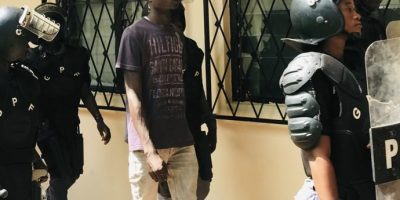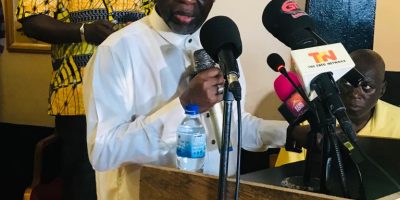 By Madi Jobarteh.
By Madi Jobarteh.
Indeed, it is not difficult to notice that Gambians are on edge given the rising spate of violent crimes across the country. Burglaries, murders and rapes appear to have increased as never before leading to increasing incidences of mob justice while the police itself have declared war on crime in a so-called ‘Operation Zero Crime’. The irony is that as the police report more arrests every day, it appears the incidences of crime also increases. What is the problem?

In my view this country cannot confront and contain the rise in crime unless the governance framework is put intact. That is, until and unless the Executive and the Legislature, collectively take particular interest and urgent action to strengthen the police, the country shall never be safe. Taking action means the Executive taking the right decisions to modernise and equip the police as adequately as possible while the National Assembly checks the Executive and the police to ensure that those decisions are bearing results.
For example, I have tried calling the Police Hotline 117 on Gamcel, Qcell and Africell only to found it unreachable! It is basic that every police service needs a well-established and responsive hotline and patrol service that people can call at any time when in distress. This is because an armed burglar could strike at 2am in any part of town. In that case one needs a nearby police station, a patrol team and an effective rescue line to call. Without these, lives and property are at great risk. Ask yourself, if such capacity exists within the Gambia Police Force? Certainly not.
Thus, the Gambia Police Force as it is presently constituted is not fit for purpose. This is because since Independence there has never been any conscious and concrete efforts being undertaken to build a modern, efficient, effective and responsive police service founded on and driven by human rights values and standards. Rather government after government continue to neglect the police so much so that poverty and deprivation became the nature of the police. Visit any police station in this country to see how damp, dark and dingy their offices are!
Like any other society, the Gambia is also transforming. Not only is the population increasing and settlements growing in size, but also the people are getting more complex with all forms of lifestyles and tools hence the increase in the numbers and nature of crimes. Such a trend also requires a police institution that is keeping abreast with or a step ahead of criminals in order to detect and prevent crime. This requires that the police are well trained, incentivised and well equipped to respond to the status quo.
To produce such a police institution requires that both the Executive and the Legislature are aware, willing and indeed act with urgency to equip the police. Unfortunately, this has not been the case since 2017, even though the Government has introduced a security sector reform program. The Gambia Police Force Act was created in 1933 that needs urgent amendment but never done until today. The mere name ‘Force’ itself has to change because the police provides public service and not force!
To make the police efficient, effective and responsive would require, first and foremost to recognise that the police station is the foundation for law enforcement and combating crime. Every community in the Gambia needs a police station. The police station is both the first respondent and first point of call for help in case of crime. For that matter, police reforms should determine what constitutes a standard police station, i.e. what personnel, skills, tools and other resources should a police station have. It is when a standard police station is defined that goes to determine the needs of that station.
As human beings, police officers need motivation to secure their wellbeing. As a community-oriented service provider, community policing must be encouraged, built and strengthened. As crime is getting more and more complex, the police need new skills, new tools and new methods. For example, the police need new skills in intelligence gathering, the use of tools like drones and equipped with vehicles, motorbikes as well as the use of police dogs and horses, as effective means of combating various forms of crimes. Not only do the police lack these tools but Gambian police are even not armed in the day and age of violent criminals!
Mounting permanent checkpoints is not only counterproductive but it is also a lazy way of working that only engenders corruption and inefficiency. It is even more counterproductive to use special units such as the Anti-Crime Unit or the PIU for daily routine police work. Special units are for special purposes because they acquire special tools and skills for certain kinds of crimes and criminals. But the fact that these units are used for normal daily police duties is indicative of the failure to build effective police stations in communities.
Therefore, to produce such an efficient, effective and responsive police institution requires that the President, ministers of Interior and Justice and the Inspector General of Police become proactive and innovative in designing such a police force. Furthermore, it requires that the National Assembly Select Committee on Defence and Security equally becomes proactive and interested to check the Executive for results. Unfortunately, since 2017 these institutions only remained reactive and inactive hence the failure to improve law enforcement in the country.
For The Gambia Our Homeland.




Ma sha Allah great and thanks for sharing